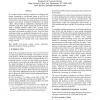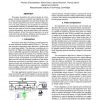123
Voted
TCSV
2002
15 years 1 months ago
2002
Abstract--In this paper, we propose a new architectural technique to reduce energy dissipation of frame memory through adaptive bitwith compression. Unlike related approaches, the ...
118
Voted
JSA
2008
15 years 2 months ago
2008
Commercial designs are currently integrating from 10 to 100 embedded processors in a single system on chip (SoC) and the number is likely to increase significantly in the near fut...
111
Voted
DAGSTUHL
2007
15 years 3 months ago
2007
In the context of the RESUME-project a scalable wavelet-based video decoder was built to demonstrate the benefits of reconfigurable hardware for scalable applications. Scalable v...
127
Voted
GLOBECOM
2009
IEEE
15 years 6 months ago
2009
IEEE
Energy efficiency has become a critical concern in designing high speed packet classification engines for next generation routers. Although TCAM-based solutions can provide high th...
157
Voted
ISLPED
1997
ACM
15 years 6 months ago
1997
ACM
We present detailed analytical models for estimating the energy dissipation in conventional caches as well as low energy cache architectures. The analytical models use the run tim...
104
click to vote
ICCAD
1998
IEEE
15 years 6 months ago
1998
IEEE
Presented in this paper are 1) information-theoretic lower bounds on energy consumption of noisy digital gates and 2) the concept of noise tolerance via coding for achieving energy...
114
click to vote
VLSID
1999
IEEE
15 years 6 months ago
1999
IEEE
This paper describes the system design of a lowpower wireless camera. A system level approach is used to reduce energy dissipation and maximize battery lifetime. System properties...
124
click to vote
ISCAS
1999
IEEE
15 years 6 months ago
1999
IEEE
In this paper, we obtain the lower bounds on total energy dissipation of deep submicron (DSM) VLSI circuits via an informationtheoretic framework. This framework enables the deriv...
93
Voted
ARITH
1999
IEEE
15 years 6 months ago
1999
IEEE
Although division is less frequent than addition and multiplication, because of its longer latency it dissipates a substantial part of the energy in floating-point units. In this ...
114
Voted
VTS
2003
IEEE
15 years 7 months ago
2003
IEEE
Irreversible computation necessarily results in energy dissipation due to information loss. While small in comparison to the power consumption of today’s VLSI circuits, if curre...


